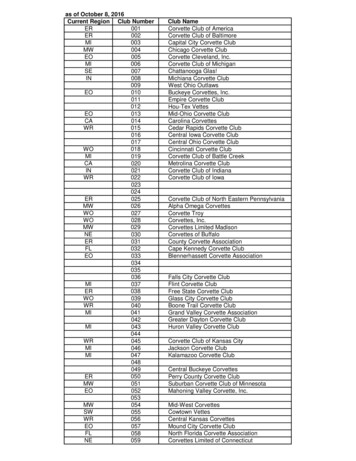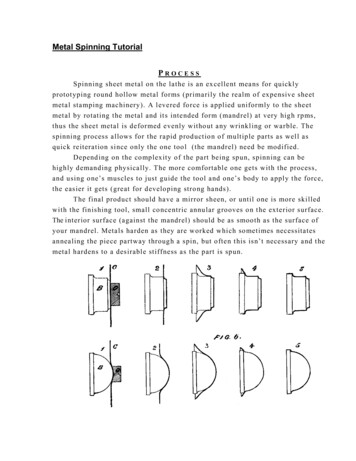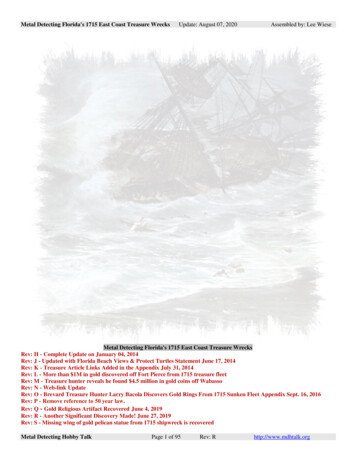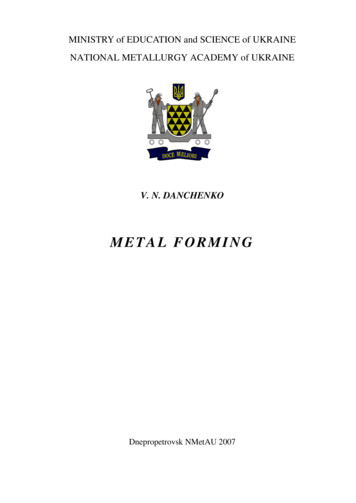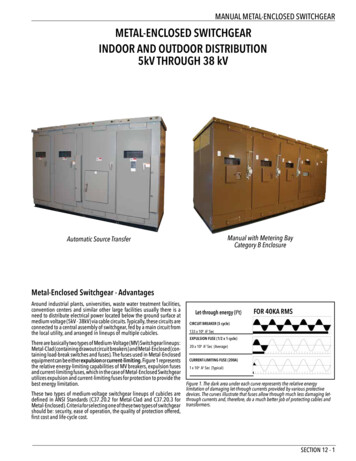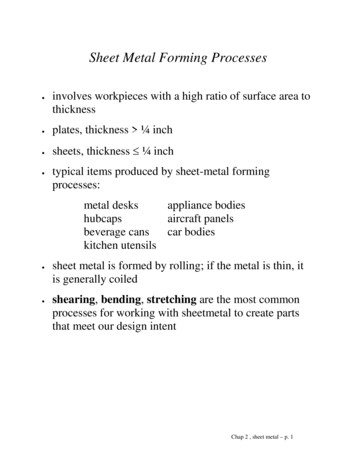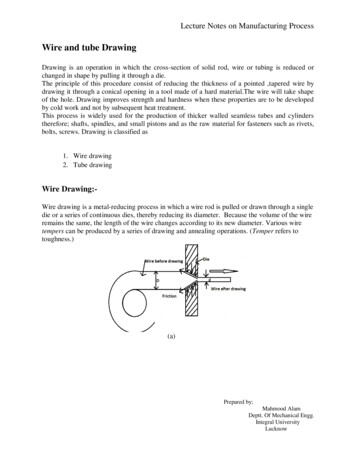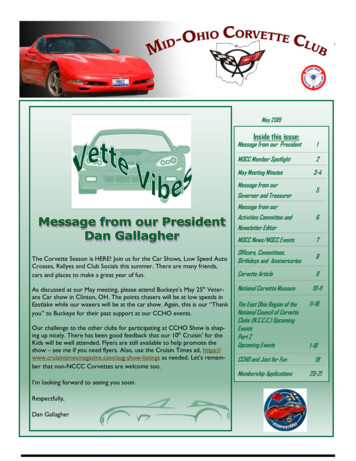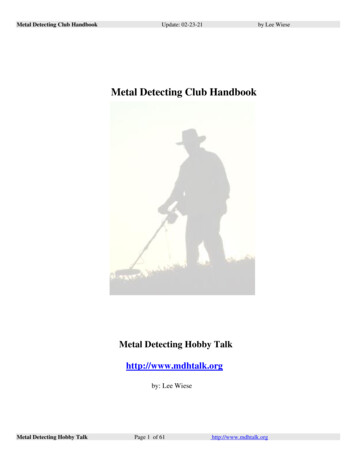
Transcription
Metal Detecting Club HandbookUpdate: 02-23-21by Lee WieseMetal Detecting Club HandbookMetal Detecting Hobby Talkhttp://www.mdhtalk.orgby: Lee WieseMetal Detecting Hobby TalkPage 1 of 61http://www.mdhtalk.org
Metal Detecting Club HandbookUpdate: 02-23-21by Lee WieseIntroductionThis Metal Detecting Club Handbook is a composition of nine MDHTALK.org articles written for and about metaldetecting clubs. All of these individual articles can be found on the MDHTALK website and are downloadable.However, by putting the individual articles into one handbook, results in a one stop shopping experience for anynew or developing club looking for a guide. This handbook is free to the metal detecting community and is inAdobe .PDF format which makes it downloadable for those who are interested in this material.Here is the table of contents for the current Version. "02-21-21” version of the handbook. Why Should I Join or Start a Metal Detecting Club?Start a Metal Detecting ClubClub's Volunteer OrganizationClub Meeting AgendaConstitution and BylawsClub’s Community ServiceClub Training GuideVolunteer Club Evidence Search TeamClub PromotionCompetition Hunt PreparationCompetition Hunt Etiquette and IntegrityCompetition Event UpdateClub Auctions, Drawings and RafflesClub Liability InsuranceClub’s Coin Purchase ProgramAppendix A: Ethics for Responsible Metal DetectingAppendix B: Sample Waiver or Release FormAppendix C: Informal Permission LetterAppendix D: Informal Permission to Metal Detect on Private PropertyTo recap the handbook's content covers why to join a club, how to start a club and a good numbers of the articlescentered on a club's charter and operation.The plan is to add at least two to three more articles to the handbook during 2014 that will cover gaps in the currentmaterial. Future article may cover the following subject matter: Tax ExemptionMonthly Show and Tell of Members FindsThe current version is forty-six pages and the expectation are that it would reach Sixty pages once completed. Ifyou download the handbook you may want to check back in a couple of months for any updates and re-downloadthe handbook.Provide MDHTALK with some feedback on what you think of the handbook. Email toMetal Detecting Hobby TalkPage 2 of 61http://www.mdhtalk.org
Metal Detecting Club HandbookUpdate: 02-23-21by Lee WieseTable of ContentsPageWhy Should I Join or Start a Metal Detecting Club?4Start a Metal Detecting Club6Club's Volunteer Organization10Club Meeting Agenda12Constitution and Bylaws14Club’s Community Service19Club Training Guide21Volunteer Club Evidence Search Team24Club Promotion30Competition Hunt Preparation32Competition Hunt Etiquette and Integrity37Competition Event Update41Club Auctions, Drawings and Raffles45Club Liability Insurance49Club’s Coin Purchase Program52Appendix A: Ethics for Responsible Metal DetectingAppendix B: Sample Waiver or Release FormAppendix C: Informal Permission LetterAppendix D: Informal Permission to Metal Detect on Private Property55565759Metal Detecting Hobby TalkPage 3 of 61http://www.mdhtalk.org
Metal Detecting Club HandbookUpdate: 02-23-21by Lee WieseArticle OneWhy Should I Join or Start a Metal Detecting Club?You may be recently retired and looking for a new hobby or you may be a long time detectorist. In either case youmay want to consider joining a metal detecting club. Metal detecting is a hobby that can be enjoyed without beinginvolved with other detectorist, however, much can be gained by being an active part of the detecting community.The new hobbyist may want to learn about the hobby while the long time detectorist can bring his detecting skilland knowledge to a club.What are the reasons for joining or starting a club?1) Meet Other Detectorist. Getting involved with a club provides the opportunity to meet others in the hobby. Aclub represents a place where one can develop new relationships and enjoy fellowship. Wpeople that have acommon interest which is metal detecting.2) Learn the Necessary Skills. If you are a newbie, joining a club can provide many opportunities to develop yourmetal detecting skill. Most clubs have training programs on how to pin point, recover targets and the propermethods and equipment to use for detecting different terrains. You may also be able to learn the skills needed todetect different types of targets such as: relics, gold, coins, jewelry, and how to detect fresh and salt water beaches.If you are an old timer at detecting but have never joined a club, your contribution to the club could be intransferring your skill and knowledge to others. This can be done by providing talks on different aspects of metaldetecting. There can be a great sense of self-satisfaction in helping others achieve their goals by sharing one'sknowledge.3) Learn the Rules, Regulations and Ethics. Most clubs have an excellent knowledge base on the rules andregulations governing metal detecting for their locality, the state and on national lands. This knowledge can bevery helpful to any detectorist; thereby keeping the detectorist lawful while in the field. One will also beintroduced to the Metal Detecting Code of Ethics and how it plays a part in daily detecting activities.4) Being a Member. Clubs can be a key component of the metal detecting community by ensuring that the hobbyis not made illegal in their community and that detecting remains a recreational hobby available to all who want toparticipate. The larger the membership, the greater the voice in promoting the hobby and the more creditability theclub can generate in the community.5) Participate in Club Meeting. Club meetings provide an opportunity once a month to get together with fellowdetectorist to review finds, visit with friends, enjoy some refreshments and win some great coin prizes from theclub raffle. Most all clubs have family memberships, thus the whole family can be part of the metal detectingadventure.6) Participate in Club Activities. Activities within any club will usually be centered around the hobby. Theseactivities take the form of competition hunts (annual and monthly). In these detecting events there will be manygreat prizes and large numbers of coin targets for the detectorist to find. Other activities in the club may becentered around guest speakers or a club member presenting a specific topic.Metal Detecting Hobby TalkPage 4 of 61http://www.mdhtalk.org
Metal Detecting Club HandbookUpdate: 02-23-21by Lee Wiese7) Community Citizenship. Many clubs are also involved in activities that are directed toward helping thecommunity (i.e.: metal detecting camp for disabled children and supporting families in need).Clubs also support many local and national historical archaeological digs which help in defining a communitiespast.A club may have developed the capability to help others locate lost valuables or to help law enforcement on crimescene searches.8) Volunteer Your Skills. Clubs provide an avenue to volunteer your skills either directly or indirectly. As adetectorist you may have strong interest in being part of the club's executive board (officer or committee volunteerchairperson). Or you may have website maintenance skills, writing skills, computer based knowledge, effectivecommunication skill, or knowledge about other related hobbies that would be of great benefit to the club'smembership.9) Keep up to Date on Changes in the Hobby. Attending the club meeting is one way to keep abreast of the hobby.There is usually information available on new metal detector releases, new detector accessories (pin-pointers,recovery tools, headphones, etc) . Club meetings are also the catalyst for learning about other club events in thesurrounding area and other states. The rules and regulation governing the hobby are constantly changing and beingpart of club will provide information on the latest challenges for the hobby.10) Have Fun. Finally, joining a club, participating in their events, developing new relationships, being part of theclub's meetings and learning more about the hobby can be a great avenue for having more fun. Club Meetings are Fun.Club Social Activities are Fun.Club Projects are Fun.Being of Service to the Club is Fun.What to Look for in a Club. Any club under consideration should have many of the following attributes as part oftheir club's charter and activities. The more of these attributes that a club has the more interesting your experiencewill be as a member.1) Tax Exempt Status9) Finds Show and Tell2) Monthly Meetings (Meeting Agenda's)10) Monthly Coin Raffles3) Guest Speakers11) Family Involvement4) Newsletter12) Club Officers5) Website13) Annual Election Process6) Annual Competition Hunt14) Club Bylaws7) Monthly or Quarterly Hunts15) Lost Items and Recovery Team8) Training Programs16) Member Recognition17) Club Member Reports18) Club Outings and Special Events19) Community Involvement Liaisons or Projects20) A Large Club Member Volunteer StaffIn Summary. Metal detecting is an adventure each time you go into the field. Being with others that are experts canmake your detecting adventure even more rewarding not just for the finds but also with the enhanced fellowshipand bonding. Metal detecting is a very exciting hobby and the next target may be the find of a life time.Metal Detecting Hobby TalkPage 5 of 61http://www.mdhtalk.org
Metal Detecting Club HandbookUpdate: 02-23-21by Lee WieseArticle TwoStart a Metal Detecting ClubHow Does Someone Get a Metal Detecting Club Started?If one search’s the internet there are a number of sites that provide an article or outline on what and how to start aclub. Rather than cover old ground, this article will try to look at a new approach to starting a club.Today the internet is probably the most important tool that can be used to start a metal detecting club. More andmore people are developing their capabilities to use email and various internet search tools to pursue their hobbies.This new found internet interest and capability are the attributes that need to be capitalized on in creating a metaldetecting club.Below are some internet networking tools that can be leveraged into developing a metal detecting clubmembership. More comments will be made on these social networking tools as the article progresses.1) Create a Club Webpage2) Setup a Meetup Webpage3) Put notification of a New Club on Metal Detecting Forums (there are many)4) Create a Club Facebook Page5) Create a Club YouTube Video6) Place Notification on CraigslistThe first action is to establish a club name (avoid using the words Treasure Hunting in the name, since it mayinvolve a negative public image about the club), once the name is identified take the first letter of each word in thename to create the internet domain name. An example: (this web site’s name is Metal Detecting Hobby Talk thedomain name is: mdhtalk.org) in this case the last word or the site name is part of the domain name rather than justthe first letter. Once you have identified the domain name there needs to be a domain name search to determine ifthe domain name is available to be acquired for the club. The Go Daddy web site is a good place to go for adomain name search.The next step is to establish the metal detecting club’s existence on the web and can be accomplished in a coupleof ways. The first approach may be to create a metal detecting club webpage. After a brief time the various searchengines will make the clubs webpage available for all to find and see on the web. A short and concise webpagewith the club name, club location, (state, city, meeting place if there is one) and contact information (email andphone number) can rapidly bring members into the club. On the web page there must also be an explanation as towhat the club will be all about.There are many website hosting companies that offer low cost hosting services. To start a website the cost shouldbe less than 5.00 per month and the hosting company will have all the tools required to accomplish the task. Mosthosting services provide templates to get started - just select a template that fits your need and replace thetemplate’s text with the club’s information. Then publish the club web site to the internet.Another approach to a club webpage is to use a social network tool called Meetup. This network tool will rapidlyallow you to setup almost everything that could be put on a webpage plus more in some cases. Again, what isMetal Detecting Hobby TalkPage 6 of 61http://www.mdhtalk.org
Metal Detecting Club HandbookUpdate: 02-23-21by Lee Wieseimportant is to identify the club name, location, and meeting place. I suggest you pick a name & location to startthe club off, contact information, purpose and objective. This social networking group software is not free but canbe very effective in starting a club and drawing in potential new members. There are a couple Meetup exampleslisted in the attachment.Another approach is to visit some of the metal detecting web based forums and putting information about your newclub in one of the sub-forums. Some of the sub-forums are there for just that purpose. This may not be the best toolto use since your targeted community on a forum will be U.S. wide. Just the same there is significant interest in thehobby with many internet users daily visiting these forums so there is the chance that someone from your area maysee the ad.Many clubs in the U.S. are turning to Facebook to bring attention to their organization, to locate new members andto use as a communication tool with the current membership. To setup a Facebook page is pretty straight forwardand there is no cost involved. Use a similar approach as outlined in the Meetup section.Creating a short YouTube video about the club’s existence can also be a way to identify new members. If thisapproach is used them the club name, city, and the state must be in the video title. The reason for this approach inthe title is that if someone is doing a YouTube search on your location the video will be easily found with thesearch tool. Just type in “metal detecting clubs” in the YouTube search tool the result will provide many ideas for avideo.Craigslist is a very good way to make the general public aware of a new club. Find the Craigslist location for yourarea. Place an ad or notification in any of the Craigslist sections such as: Community groups, events or local news.Select the sub-group based on how it may be used in the local area.Here are a few traditional things that can be used to enhance the membership search results. Consider placing an ad in the local newspaper. Usually there is one day a week when the newspaper will offerfree or for a small fee notification about clubs and organization. Identify the local hobby businesses and ask to place a pamphlet or flyer in their business concerning the newclub. This flyer should have the same information that has been placed on a website. The contact information isextremely important so a potential new member knows who to contact and where to go. Occasionally a local newspaper will do public interest articles and place them in the local news section. Contactthe newspaper to find out if there is any interest to do such an article concerning a new metal detecting club inthe area. The local radio station may have a human interest hour and the station might be willing to highlight the newmetal detecting club on one of its programs.The Next Step.By using some of the suggested ways mentioned the assumption is that people with a similar interest have comeforward and are interested in the new club. The next step is to hold the first meeting with the interested parties. Thesuggestion is that this meeting be very informal. The major objective of the first meeting should be to get to knowone another. The way to accomplish this is to have each person wear a “stick on” name tag and fill out the sign insheet before the start of the meeting. Start the meeting by having each person provide a self-introduction. Theintroduction should reveal some back ground information on themselves (do they metal detect, detector type, whatskills might they have to support the club, etc). Once the introductions are over it is time to develop the direction ofthe club.Metal Detecting Hobby TalkPage 7 of 61http://www.mdhtalk.org
Metal Detecting Club HandbookUpdate: 02-23-21by Lee WieseThe first action: Is there enough interest in the group to develop the club further?If the answer is yes, with member involvement set out to identify what the new club structure should be and howthe membership would like the club to support the hobby. In future club meetings the more difficult action itemsand assignments can take place. Remember to keep the first meeting light and friendly and not overburden the newmembers with responsibilities and duties. The objective is to have fun and establish a rapport with the members.Here are some first & second meeting topic suggestions: Identify and Elect Officials (President, Secretary, Treasurer and Vice President)Set future Meeting DatesIdentify Future Meeting PlaceEstablish Membership DuesIs the Club to have Formal Name tags?Establish a Meeting AgendaDetermine the Meeting Structure and Format (Informal or Format)Is the Club to:have Bylaws?be a Non-profit Organization?have Monthly Show & Tell of Members Finds?have a Monthly Coin and 50/50 Raffles to raise funds?have Speakers from Related Hobbies?have Meeting Refreshments?Identify Chairperson Positions if any?Identify an Outing ChairpersonEstablish a Date & Place for the Clubs First Outing / HuntDetermined the Club Objective and Mission StatementIs the Club Involved in the Community? (Evidence Search, Park Involvement, etc.)Is the Club Involved in Local & National Metal Detecting Politics?Will the Club use the Internet (Website, Meetup, Social Tools, etc)From this list the group can easily create the next steps for the club. Remember to keep advertising the club toidentify more individuals with similar interest. Never lose sight of the need to have fun in the club and havedifferent type of outings for the membership.Attachment:Other web pages on the Metal Detecting Hobby Talk site that Support this Article are:Metal Detecting Club Bylaws: etal Detecting Ethics: http://www.mdhtalk.org/ethics/ethics.htmClub Evidence Search Team: ub-evidence-search.htmMetal Detecting Organization Description: organization.htmMetal Detecting Club Promotion: b-promotion.htmClub’s Community Service: community-service.htmClub Meeting Agenda: http://www.mdhtalk.org/forms/agenda/agenda.htmThis is a list of Metal Detecting Forums that should be able to support messages about a new metal detectingclub. Many of the forums require a user name and password and I suggest using the same user name and passwordMetal Detecting Hobby TalkPage 8 of 61http://www.mdhtalk.org
Metal Detecting Club HandbookUpdate: 02-23-21by Lee Wiesefor all of the forums you join and visit. These forums have many sub-forums specializing in very specific hobbyrelated topics. Find's Treasure - 46 Sub-ForumsFriendly Metal Detecting - 20 Sub-ForumsTreasure Net - 113 Sub-ForumsTreasure Quest - 36 ww.treasurequestxlt.com/community/index.phpSocial Internet Networking Tools FacebookYouTube /www.craigslist.org/about/sitesWeb Site Hosting CompaniesConsumer Ranking of Hosting Sites @http://www.consumer-rankings.com/hosting/Low Cost Website Hosting Companies IpageFat CowJust HostInMotionHost GatorGo DaddyStartLogicRegister.comBest Web Hosting ServicesMetal Detecting Hobby web-hosting-sites/Page 9 of 61http://www.mdhtalk.org
Metal Detecting Club HandbookUpdate: 02-23-21by Lee WieseArticle ThreeClub's Volunteer OrganizationA club’s organizational structure is the heartbeat for the club’s membership at large and it is entirely made up ofvolunteers. The elected officers must provide the leadership atmosphere to move the club forward in the fields ofhobby education, legislation activity, community involvement, guest speakers and all the other interesting andimportant aspects of the hobby.Metal detecting clubs vary greatly in size with some clubs having memberships well over a hundred and otherclubs with membership of 20 to 100. This means that some clubs have more resources than others but thechallenges for each club’s leadership are much the same.In the table below you will see some of the resources required for a club organization that must meets the needs ofthe club membership and the needs of the hobby. This list of appointee and volunteers should not be considered theonly required club resources but a very good starting point.Remember every one that holds a position in a club is a valuable volunteer who provides their time, skill andtalents.What are the roles and responsibilities of club officers and how should they execute those responsibilities? President and Vice President must set aside their time to provide the necessary leadership for the club.Leadership is getting members involved, delegating responsibilities, and requiring general meetingparticipation by all appointee and volunteers in their respective roles.Leadership is not being the sole voice at the monthly general club meeting. Now having said that, I havewitnessed clubs that do have a strong center leader, are very large and very productive. However, having manymembers involved in the club’s activities builds organizational strength and centralism. In the future as newofficers are needed for vacant positions these positions can be filled from the appointee / volunteer members whohave already gained valuable experience in club matters.Leadership is holding regularly scheduled agenda driven board meetings. The board meeting should include allof the elected, appointed and volunteer positions. The agenda should include a review of club projects, review ofopen business actions and a discussion about what new club issues or projects should be considered.Metal Detecting Hobby TalkPage 10 of 61http://www.mdhtalk.org
Metal Detecting Club HandbookUpdate: 02-23-21by Lee Wiese The Secretary should keep detailed minutes of all board and general meeting for future reference and for boardaction. The Treasurer must handle all revenues and expenses,provide detailed monthly reports, year end summaryanalysis, handle all tax matters and provide the clubwith an analysis for managing membership dues.Below is a brief definition on the role & responsibilities of each appointed or volunteer position. Community Liaison: person or persons who interface with public officials (Parks, Law Enforcement, NewsOutlets, etc) on the club’s behalf.Curator: person responsible for acquiring club prizes for raffles & hunts.Evidence Recovery: person responsible for having a team in place to provide assistants to law enforcement.50/50 Drawing: an individual who handles this fund raiser for the club.Finds of the Month Chairperson: an individual who manages the club’s show and tell portion of the meeting.Diamond & Gold Tester: an individual who has the expertise & tools to evaluate gold & diamonds formembers.Historian: an individual who records important event information for future club milestone celebrations.Hospitality Chairperson: a individual who greets visitors at club meetings, handles introductions and doesfollow-up with visitors after the meeting.Hunt Master: individual responsible for all the club’s planted & unplanted hunts.Legislation Liaison: an individual that informs the club about any legislation issues either national, state, or atthe local level and recommends a form of action for the club.Librarian: provides storage and displays & signs out the club’s books and videos.Manufacturers Representative: interfaces with equipment mfr. and keeps the members informed of newofferings.Membership Chairperson: handles membership registration.National Organization Liaison: contact between the club and a national hobby association.Newsletter Editor: generates & distributes the club monthly newsletter.Photographer: records club activities by taking photos for the newsletter editor and web-site editor.Program Director: coordinates all club programs (raffles, drawings, hunts), develops speaker programs andworks with other appointees & volunteers on special club programs.Raffle Chairperson: handles all aspects of the club raffle.Refreshments: provides refreshments at club meetings.Web-site Editor: designs and maintains the club web-site.What should your take away be after reading this article? First of all officers and others support members in theclub are volunteers. The club volunteers and specifically club officers must provide leadership so that the club willmove forward and that members feel good and are excited about going to their monthly meetings.Metal Detecting Hobby TalkPage 11 of 61http://www.mdhtalk.org
Metal Detecting Club HandbookUpdate: 02-23-21by Lee WieseArticle FourClub Meeting AgendaThis template is a suggested general meeting agenda for metal detecting and prospecting clubs. The agendatemplate also includes some definitions and responsibilities for portions of the agenda.Welcome from the President (The president should provide meeting leadership by requiring the club’s variousvolunteers and membership to be involved in the meetings content.) Presidents Message (Update on the hobby in the local area.)CLUB’S Board Meeting Results (Clubs should have a monthly board meeting.)Special Announcements & Board IntroductionsBirthdays this Month (Members birthdays)Visitor Introduction (Have each visitor present themselves to the club.) Visitor Drawing (Each visitor should be given a number or ticket for the drawing.)New Member Introduction (Have each new member present themselves to the club)Ice Breaker (Optional Joke, this joke should rotate between the board members.)Secretaries Report (Recaps the previous monthly meeting minutes and asks for corrections.)Treasure Report (Provide the membership with monthly financials and how the club is doing against its budget.)Vice- Presidents Message Report on Monthly Raffle ItemsMembership Report (Chairperson Handles Membership Registration.) Membership DrawingHunt Master Report (Individual Responsible for all of the Club’s Planted & Unplanted Hunts.)Committee / Chairperson Reports (This is a suggested list of Committees and Chairpersons that may be part ofany club. If these or other positions exist in your club the spokes person for a specific function should be requiredto get in front of the membership and provide a report each month.) Community Liaison: person or persons who interface with public officials (Parks, Law Enforcement, NewsOutlets, etc) on the club’s behalf. Curator: person responsible for acquiring club prizes for raffles & hunts. Evidence Recovery: person responsible for having a team in place to provide assistants to law enforcement. Diamond & Gold Tester: an individual who has the expertise & tools to evaluate gold & diamonds formembers.Metal Detecting Hobby TalkPage 12 of 61http://www.mdhtalk.org
Metal Detecting Club HandbookUpdate: 02-23-21by Lee Wiese Historian: an individual who records important event information for future club milestone celebrations. Hospitality Chairperson: an individual who greets visitors at club meetings, handles introductions and doesfollow-up with visitors after the meeting. Legislation Liaison: an individual that informs the club about any legislation issues either national, state, or atthe local level and recommends a form of action for the club. Librarian: provides storage and displays & signs out the club’s books and videos. Manufacturers Representative: interfaces with equipment manufactures and keeps the members informed ofnew detector offerings. National Organization Liaison: contact between club and national hobby associations. Newsletter Editor: generates & distributes the club monthly newsletter. Photographer: records club activities by taking photos for the newsletter editor and web-site editor. Program Director: coordinates all club programs (raffles, drawings, hunts), develops speaker programs andworks with other appointees & volunteers on special club programs. Refreshments: provides refreshments at club meetings. Web-site Editor: designs and maintains the club web-site.Individual Member Reports (Individual members may have knowledge about related hobbies that may be ofinterest to the membership)Review of Old Business (Previous Meeting’s New Business)New Business (New Topics and Discussion) Review Board Meeting Actions Ask for Topics or Issues from the Membership and Board Members Review Committee Reports for ActionsFinds of the Month (Show and Tell) Finds of the Month Chairperson: The chairperson should take charge of the Show & Tell portion of the meetingand have each member get up in from of the membership and explain their finds. Provides a process for awarding the best finds each month for Coin, Jewelry, Relic, etc.Break (15 minutes)Special Events Guest Speaker (No longer than ½ hour) Training Session (May be at the meeting’s end)Monthly Raffle (Raffle Chairperson handles all aspects of the club raffle.) Coin Raffle 50/50 DrawingAdjourn Meeting (Recap of important issues before adjournment)Metal Detecting Hobby TalkPage 13 of 6
Metal Detecting Club Handbook Update: 02-23-21 by Lee Wiese Metal Detecting Hobby Talk . This handbook is free to the metal detecting community and is in Adobe .PDF format which makes it downloadable for those who are interested in this material.

